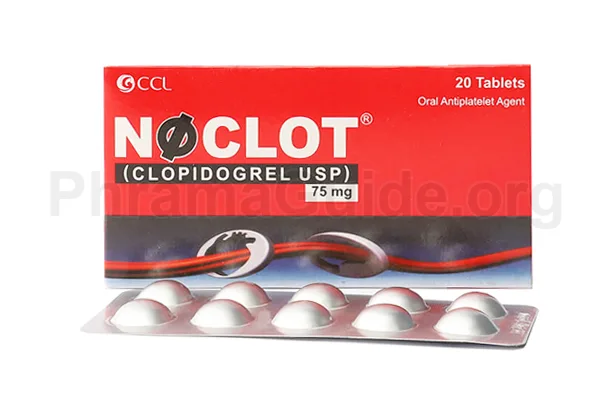Noclot tablet is an antiplatelet medication that is primarily used to reduce the risk of blood clot formation and subsequent cardiovascular events in individuals with certain conditions. It is used for:
- Prevention of Heart Attack: Noclot is commonly used to reduce the risk of heart attack in patients with acute coronary syndrome, including unstable angina or recent heart attack.
- Prevention of Stroke: Noclot is used to lower the risk of stroke in individuals who have had a recent ischemic stroke or a transient ischemic attack (TIA), also known as a mini-stroke.
- Prevention of Blood Clots in Stents: Noclot is also used to prevent blood clot formation in patients who have undergone coronary artery stenting. It helps maintain the patency of the stent and reduces the chances of stent thrombosis.
- Peripheral Artery Disease: Noclot may be used in individuals with peripheral artery disease (PAD), a condition characterized by reduced blood flow to the limbs, to reduce the risk of cardiovascular events and improve symptoms.
Off-label Uses of Noclot Tablet
- Other Conditions: Noclot may be prescribed for atrial fibrillation, where there is a risk of blood clots forming in the heart and causing a stroke, or as part of dual antiplatelet therapy following certain cardiovascular procedures.
- Acute Coronary Syndrome: In certain situations, Noclot may be used off-label in combination with other antiplatelet drugs, such as prasugrel or ticagrelor, for the treatment of acute coronary syndrome.
- Intracoronary Stent Placement: Noclot may be used off-label for an extended duration following intracoronary stent placement, particularly in cases where the patient cannot tolerate dual antiplatelet therapy with aspirin and a more potent antiplatelet agent.
- Thrombotic Thrombocytopenic Purpura (TTP): TTP is a rare blood disorder characterized by blood clot formation in small blood vessels. Noclot may be used off-label as an adjunct treatment in conjunction with other therapies to manage TTP.
- Peripheral Arterial Disease: Noclot may be used off-label in individuals with peripheral arterial disease (PAD) to reduce the risk of cardiovascular events or to improve symptoms, similar to its approved use in coronary artery disease.

What is Noclot?
Noclot is one of the leading brands of Clopidogrel, manufactured and marketed by (CCL) Consolidated Chemical Laboratories (Pvt) Ltd, Pakistan.
Noclot Alternatives : Other Similar Brands
Here are some alternative brands of Noclot and their manufacturers.
- Lowplat : Pharmevo Pakistan (Pvt) Ltd.
- Isteblix : Pfizer Laboratories Inc.
- Pailet : Merck Private Ltd.
- Pidogril : Highnoon Laboratories (Pvt) Ltd.
- Platrid : Sami Pharmaceuticals (Pvt) Ltd.
- Plavix : Sanofi Aventis (Pakistan) Ltd.
- Pletlo Plus : Wilsons Pharmaceuticals.
- Progrel : Tabros Pharma.
- Riplan : Martin Dow Pharmaceuticals (Pak) Ltd.
- Seaclop : Searle Pakistan (Pvt) Ltd.
- Thrombonil : Standpharm Pakistan (Pvt) Ltd.
Noclot : Available Formulations and Strengths
Presently, Noclot is available in Tablet Form.
Noclot Tablet : 75mg strength.
Who Should Not Use Noclot?
Noclot has certain contraindications, which are situations or conditions in which the use of Noclot is not recommended due to potential risks and adverse effects.
Hypersensitivity: Noclot is contraindicated in individuals who have a known hypersensitivity or allergic reaction to Noclot or any component of the medication. Allergic reactions can range from mild skin rash to severe allergic reactions like anaphylaxis, which can be life-threatening.
Active Bleeding: Noclot is contraindicated in patients with active pathological bleeding, such as peptic ulcer disease, intracranial hemorrhage, or active bleeding disorders. The use of Noclot in these cases can exacerbate bleeding and increase the risk of severe hemorrhage.
Severe Liver Disease: Noclot is metabolized in the liver, and severe liver disease can affect its metabolism and increase the risk of bleeding complications. Therefore, Noclot is contraindicated in individuals with severe hepatic impairment.
Coagulation Disorders: Noclot should be used with caution or avoided in patients with significant coagulation disorders or a history of bleeding disorders, as it can further impair normal blood clotting mechanisms.
Recent Surgery or Trauma: Noclot should not be initiated immediately before or after major surgery, including procedures like coronary artery bypass grafting (CABG), due to an increased risk of bleeding. The timing of when to stop and restart Noclot in relation to surgery should be carefully considered in consultation with the treating physician.
Pregnancy and Breastfeeding: Noclot should be used with caution in pregnant or breastfeeding women, as its safety during pregnancy and lactation has not been extensively studied. The potential risks and benefits should be evaluated by the healthcare provider before initiating or continuing the medication in these situations.
What is the Recommended Daily Dosage of Noclot?
The usual recommended dosage for most indications is One Tablet of 75mg, taken orally once daily.
Noclot dose for Acute Coronary Syndrome (ACS):
- Loading Dose: 300 mg to 600 mg (usually 300 mg) taken once as a loading dose.
- Maintenance Dose: 75 mg taken orally once daily thereafter.
Noclot dose for Prevention of Atherothrombotic Events:
- Maintenance Dose: 75 mg taken orally once daily.
How Noclot Works?
The active metabolite of Noclot selectively and irreversibly binds to the P2Y12 receptors on the surface of platelets. By binding to these receptors, Noclot inhibits the signaling pathway triggered by ADP, which normally leads to platelet activation and aggregation.

Leave A Comment